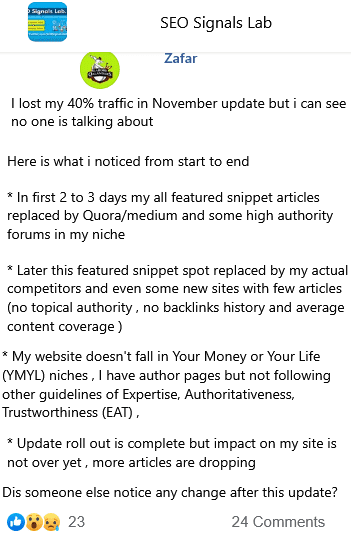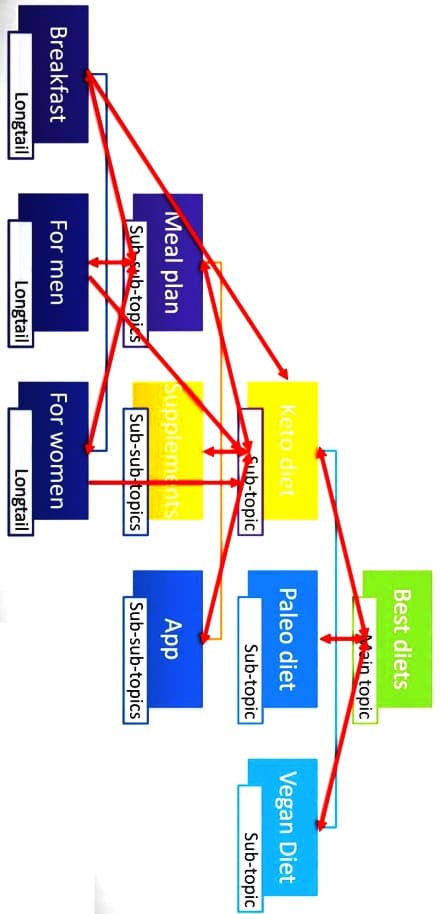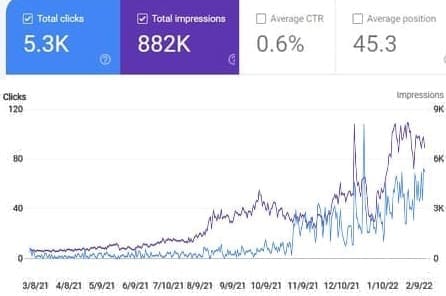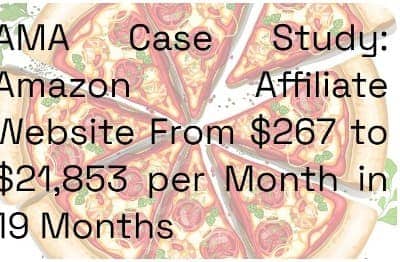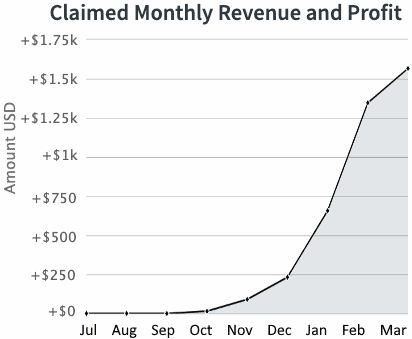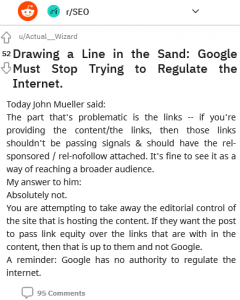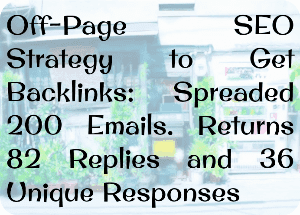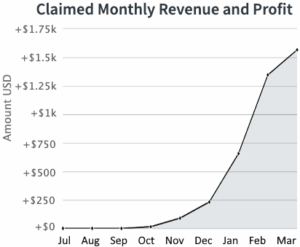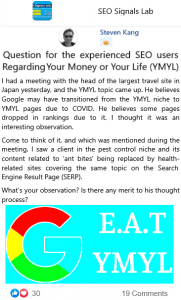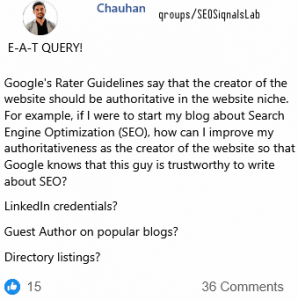I lost my 40% traffic in November update but i can see no one is talking about
Here is what i noticed from start to end
* In first 2 to 3 days my all featured snippet articles replaced by Quora/medium and some high authority forums in my niche
* Later this featured snippet spot replaced by my actual competitors and even some new sites with few articles (no topical authority , no backlinks history and average content coverage )
* My website doesn't fall in Your Money or Your Life (YMYL) niches , I have author pages but not following other guidelines of Expertise, Authoritativeness, Trustworthiness (EAT)
* Update roll out is complete but impact on my site is not over yet , more articles are dropping
Dis someone else notice any change after this update?
18 👍🏽2 🤯2 😢2324 💬🗨
📰👈
No , hired writers
Micha
All "Expertise, Authoritativeness, Trustworthiness (EAT) guidelines" are just speculations by Web marketers who are not in a position to know what Google is rewarding. There is no EAT algorithm and no EAT signals.
By the same token, there really aren't any Your Money or Your Life (YMYL) "niches" as far as the algorithms are concerned. A site might trigger stricter algorithmic scrutiny because it correlates well (according to what Google has learned about it) with what a human might consider to be a YMYL site.
The strongest kinds of signals for these sites would be any shopping cart or order form that requests financial information, such as banking information or debit/credit card information. Even a Paypal or other payment processor link MIGHT trigger a YMYL-style evaluation.
Although the Quality Rater Guildelines can be helpful in understanding what the search engineers would LIKE to reward in the SERPs, the QRGs don't provide any insight into what the algorithms are actually doing. In that respect, trying to leverage tips based on QRG definitions isn't helpful.
Questions to ask yourself include:
1. How might your site be violating search engine guidelines in ways (or degrees) the others are not?
2. How might those sites be providing value your site does not?
3. What would a human visitor think of those sites in terms of quality and expertise, that is missing from your own site?
Be as self-critical as possible. Everyone thinks that their own site is "expert", "authoritative", and "high quality" – but your opinion (and mine) doesn't matter.
Maybe you're just seeing a glitch or bug in the algorithms. Maybe you didn't understand what Google really wants to promote in the SERPs.
🤯15
That's just a teeny tiny bit wrong. The bit where you say there are no EAT signals. Googlers have stated there is no EAT signal (singular), and they have been so careful about stating there is no one single thing that it really stands out.
But we know there are a whole range of signals that approximate many of the same sorts of things.
I agree with your overall message entirely, especially that there is no singular separate EAT signal, *and* that the articles I have seen about Expertise, Authoritativeness, Trustworthiness (EAT) are mostly speculation, and more often than not, not even very well educated speculations.
I have seen several papers from IR scientists that talked about trust signals, especially in regard to links. We also know that Google made statements about 'fake news' and how they were combatting it with what sounded an awful lot like synonyms for Expertise, Authority, and Trust based signals.
Even the YMYL stuff way back when was working to promote sources that had Expertise, Authority, and Trust, right? And that means they must have metrics and systems already in place doing that for the YMYL niches.
🤯
Micha » Ammon
"But we know there are a whole range of signals that approximate many of the same sorts of things."
You're assuming they mean there is a 1-to-1 correlation between those unnamed, undescribed signals and E-A-T. I am not prepared to make such an assumption. I think that's too great a leap of faith.
They certainly have SOMETHING in place, but given how large their Representation Vectors can get (thousands of parameters in some recent experiments, but certainly hundreds per page), I think it's setting the wrong expectation to lead people to believe there is something E-A-Ty on the inside.
They wouldn't get so many things wrong if they could calibrate the Search Engine Result Pages (SERP)s with that level of precision.
And *I* am assuming they are using Feature Learning/Representation Vectors for this kind of stuff. They don't have to be.
Ammon 🎓 » Micha
Actually I was thinking more along the lines of them coming out with a Bayesian-like probability score where they say "We calculate this to have an 86% probability of being authoritative using the combined factoring of 22 signals. Since 85% probability is the threshold, this passes."
But I always liked Bayesian Probability stuff. They tend to prefer N-dimensional vectoring. 😃
Micha » Ammon
Many of their learning algorithms from the past few years look for 2 thresholds in the data. Stuff below the lower threshold is classified one way; stuff above the upper threshold is classified the other way. Anything in the middle is too vague and opaque to be useful and so is discarded.
Those thresholds are messy, to say the less, or maybe just convoluted. Complicated, to be sure. We're not talking about a single score, but many scores.
Machine learning is the preferred method for pattern analysis now. And it relies extensively on weighted averages, which can be adjusted for proximity (based on whatever is being evaluated) or other relative factors.
By the time any of their algorithms get through crunching data, whatever arbitrary scores the systems had assigned at the beginning have vanished into a computated mush.
That's the problem with all these SEO strategies that attempt to optimize for E-A-T. The people behind those strategies don't see how the algorithms have to allow for a multitude of opinions. How do you do that (mathematically)?
To say, "weighted averages," is a gross over-simplification in my opinion.
Truslow 🎓
I don't know about E and A, but John Mueller has started to use the T word a lot more liberally lately. And he's using it in the context of Google's Trust in a Site.
Here's a fairly recent example:
This was always something that they quite carefully avoided in the past and I only noticed the change in the days leading up to the Spam update. The way they use and describe "quality" has started to be subtly altered too. In the past it was usually "create quality content" but they are now starting to describe it as a "sitewide" thing – which means that, at some level, there must be a value.
Sooooo. Take that as you will, but… I suspect there's a bit of a change in this that's happening right now. And, if Google is smart, they will NEVER reveal too much about how it all works.
Micha » Truslow
There's always been a trust factor at Google. Matt Cutts used to talk about "trusted links" quite often. And in 2006 he added this to one of his blog posts:
"By the way, it looks like the primary issue with the Windows Live Writer blog was the large-scale migration from to about a month ago. We saw so many urls suddenly showing up on that it triggered a flag in our system which requires more trust in individual urls in order for them to rank (this is despite the crawl guys trying to increase our hostload thresholds and taking similar measures to make the migration go smoothly for Spaces). We cleared that flag, and things look much better now."
So Googlers talking about "trust" is nothing new.
Personal Cloud Storage – Microsoft OneDrive
ONEDRIVE.LIVE.COMPersonal Cloud Storage – Microsoft OneDrive
Truslow 🎓 » Micha
Them talking about trust there is still in the context of individual things – in this case URLs. It wasn't that caused the problem – it was a mass of individual links appearing which triggered a spam flag.
It's not the use of the word that is changing – it is the way in which they use the word and what they are describing when using it that is changing.
Micha » Truslow
I also mentioned "trusted links". John's recent comments are really nothing new – to me if not to anyone else.
I've had a number of conversations with Googlers over the years. They've always had "trust" built into their system.
E-A-T isn't really new, either. Danny Sullivan occasionally refers people interested in E-A-T to a list of questions that was originally published in 2011 to help Webmasters cope with the Panda algorithm.
James
Ted covered this in a recent SEO fight club. The data he had suggests backlinks have become a more significant ranking factor as part of the Nov update, which might explain why forums like Quora are ranking higher due to their sheer volume of links. Doesn't explain why new sites would appear but that could just be volatility associated with the algo trying to establish a new status quo
Sourav
This happend with one of my websites 4 months ago during Algorithm update. But from last month the content which were outranked coming their places again.
1. I have updated a few articles. They are improving.
2. Also the content which I did not update they are also improving surprisingly.
Did not build any links.
So I can say you have to wait and see. And keep publishing fresh articles. 🚀
📰👈
Zafar ✍️ » Sourav
Did you reduce number of words from existing articles? Can you mention few things updated in old content?
Sourav » Zafar
I gave special attention on H1, H2s, meta title and the introduction part. I gave special attention on competitors and tried to change wring style that connects the readers. Did not give much attention on word counts. Tried to be informative. The one thing I included is Frequently Asked Questions (FAQ). You can try using FAQ schema and see if there is any changes.
🤔2
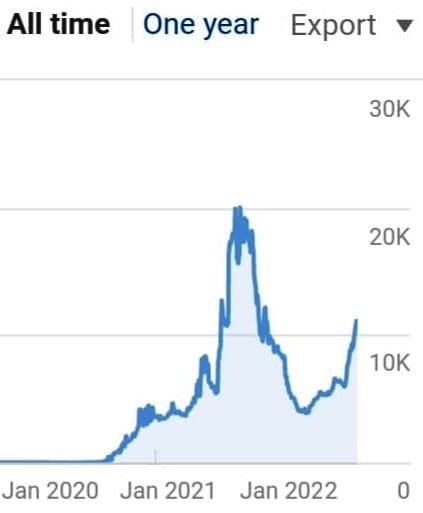
Does Google Crawl and Index Users Generate Content Sites like Quora and Medium Easier than Yours?
Is Crawled Currently Not Indexed Will Never or Hard To Show because It Only been Archive?
Discuss Discovered Currently not Indexed by Google SE
ROI of SEO Marketing gets Lower, and Google is looking Tired to Index New Entry Pages, so Should We Buy Some Ads?
an SEO Analyst Believes 301 redirection of an URL to the Same Slug Retains the Full Pagerank
What is PageRank? Is it the same as Backlink Juice or Link Equity? PageRank was a Patent Created by Google’s Founders
Strategy to offset the new Google Update that works Positively
Does Backlinking From Low-Quality Article But It has Keyword Golden Ratio Still Gives Positive Off-Page SEO?
Does Google Penalize Duplicate Content?
